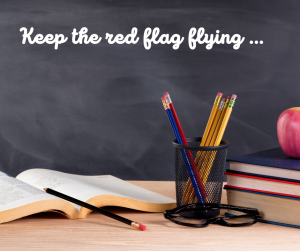Teaching, and what should be left out
 Teaching is a professional job.
Teaching is a professional job.
Teachers must be professional at all times and leave their politics outside the school gate.
What they must never do is seek to influence their pupils in a partisan way. It is a fundamental expectation of the profession to present all subject matter in a balanced manner.
It should not need repeating.
However, a worrying story emerged recently in the press that showed how these fundamental rules of teaching need to be repeated.
Staff at Welbeck Primary School in Nottingham instructed 10-year-olds to write letters criticising the Prime Minister.
Teachers are said to have encouraged them to attack the Prime Minister and urge him to resign, in what was described as ‘indoctrination’.
What made it worse was the school felt this was perfect material to share online, thereby broadcasting their partiality to the world.
It posted photos of the students, one of whom was standing next to a whiteboard that had ‘lies, mistrust and selfish’ written in an adult’s hand, next to the name ‘Boris Johnson’.
Furthermore, the school tweeted a letter purportedly written by a Year 6 pupil (aged 10 or 11) and addressed to a Labour MP. That child must be one of the most precocious to have entered a classroom.
The typed missive on an A4 sheet detailed the global economy and employment figures, called the Prime Minister a liar and urged him to resign. The ‘child’ rather arrogantly stated at the end, ‘This letter is on behalf of my country’.
Perhaps it should be no surprise that the children thought and acted in this way.
A school’s direction comes from the top and the headteacher of this school has tweeted numerous left-wing messages and used the hashtag, ‘Tory Scum’.
That is not to say politics shouldn’t be taught in schools. The subject absolutely should be. It is important to educate children about political systems and debate issues with them.
However, my experience of most primary school children is that many of them don’t even know the name of the Prime Minister or what right-wing or left-wing really means.
Young children can easily be influenced by what a teacher says and there needs to be extreme care in the way political issues are raised.
There should be no bias or partisan views expressed by teachers in classrooms.
It is fine to allow children to express their views, but it must be their views and not the teacher’s.
I wonder how Labour politicians would have reacted if outright criticism was made in the classroom about Jeremy Corbyn or Sir Kier Starmer.
There would be outrage and ‘Tory plots’ would be cited as the cause.
The whiteboard in the photo Tweeted by Welbeck Primary School shows quite sophisticated comments that have no doubt been put up by the teacher in a selective manner.
Putting young children in front of a whiteboard pointing to various comments is a highly questionable thing to do.
It’s quite clear that the figures and detailed statements on that board are quite grown up and would not have been expressed by the pupils in that way.
In my view, the teacher has been leading the children to express things and put their own spin on it.
I once had a pupil who wanted to write to the Prime Minister (John Major at the time) about a particular issue.
I helped him do this. It came from the child and expressed his sentiments entirely.
He received a reply too, signed by the Prime Minister.
This was all done with respect and without political slogans or propaganda. The child framed the letter from John Major and put it on his wall and felt very privileged for being taken seriously.
One issue we face is that the teaching profession leans to the left politically – at quite a sharp angle.
A Schools Week article highlighted this when it wrote: “Since 1997, the profession has traditionally voted Labour, along with many other public service workers. Our Teacher Tapp panel – which now numbers over 3,500 – followed this same pattern at the last election. In 2017, around 60 per cent of them said they cast a vote for the Labour Party, while only 12 per cent voted Conservative.”
It added: “Which might account for why so many Tory teachers have said they feel uneasy talking about politics in the staffroom.”
Clearly, this is at odds with the population, which hasn’t returned a Labour government since 2005.
In these overwhelmingly left-wing environments, it is perhaps no surprise that teachers believe their views are shared by everyone and to broadcast them is uncontroversial.
But it is extremely controversial. It is virtue signalling. And it is totally unprofessional and must be resisted.
ends